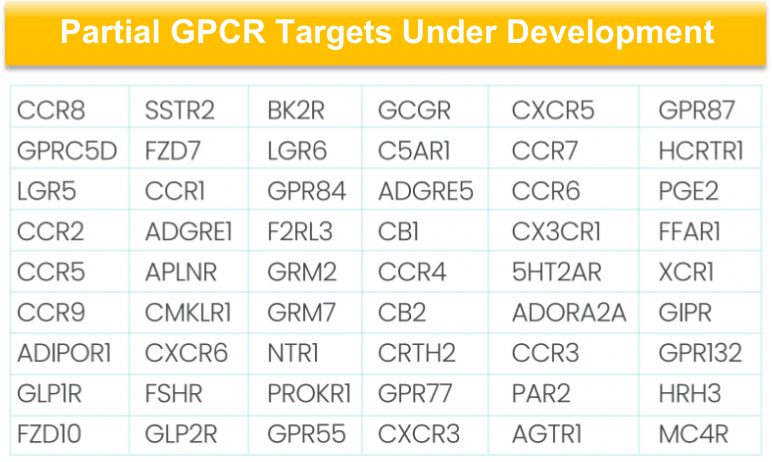GPCR (G protein-coupled receptor) proteins are the most abundant membrane proteins in the human genome. The main function of GPCRs is to transmit extracellular information into the cell through downstream intracellular signaling, which in turn causes a variety of cellular responses. One-third of the drugs on the market target the GPCR protein by either activating or blocking GPCR signaling pathways to achieve therapeutic effects. Compared with small molecule drugs, anti-GPCR antibody drugs can not only activate or block the signal pathway, but also directly target and eliminate diseased cells through antibody-dependent cellular cytotoxicity (ADCC) or antibody-dependent cellular phagocytosis (ADCP).
In the past, the progress of anti-GPCR antibody drug development was hampered due to the difficulty of antigen preparation and the lack of high-throughput screening methods for anti-GPCR antibody discovery. However, with the rapid development of antibody development technology, Biocytogen has established a platform dedicated to improving the success of anti-GPCR antibody discovery.
Advantages of Biocytogen’s anti-GPCR discovery platform
1. Antigens with native conformation: In order to be able to scientifically and comprehensively evaluate the druggability of targets and screen for antibodies with different binding epitopes and physiological functions, Biocytogen insists on the immunization of mice with antigens with intact native conformation. Therefore, GPCR antigens are provided to RenMiceTM by means of DNA immunization and cellular immunization, ensuring that the fully human antibodies obtained are highly specific and diverse.
2. In vivo DNA transfection technology: In order to further improve the effect of DNA immunization, Biocytogen selects suitable transfection adjuvants in combination with different injection methods based on numerous experimental data to improve the efficiency of in vivo transfection of DNA, and improves the expression level of GPCR antigens in mice by optimizing the plasmid element.
3. Immunopotentiating peptides: Fusion of a short peptide fragment that effectively binds to mouse MHC class II molecules to the intracellular C-terminal domain of GPCR enhances the immune response in mice by activating CD4+ T cells.
4. Knockout mice and humanized mice: Biocytogen uses target gene-knocked out RenMice (“RenMice HiTS Platform”) for antibody discovery. Compared with non-knockout mice, the knockout RenMice are able to produce antibodies that identify antigen sequences that are identical in mice and humans, thereby turning the intrinsically minimal extracellular domains of the GPCR targets into recognizable epitopes. The use of knockout mice not only improves the diversity of epitopes recognized by antibodies, but also results in more antibodies with cross-recognition to human and mouse targets, which facilitates efficacy validation in mice. Many GPCR targets have low homology between humans and mice, making it difficult to obtain antibodies that recognize both human and mouse GPCRs. For these targets, Biocytogen has bred target gene-humanized mice or mice humanized for both the ligand and receptor to provide suitable experimental animal models for the targets where cross-reactive antibodies are difficult to obtain.
For more information about the target gene knockout RenMice available for your target, search our HiTS Platform library or contact us at [email protected].
Anti-GPCR Antibody Development Progress
Related News: July 21,2022- Biocytogen and LiberoThera Achieve Milestone Progress in Co-Development of Fully Human GPCR Antibody Drugs



